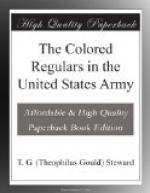MEN—Wounded, First Sergeant A. Houston,
First Sergeant
Robert Milbrown, Q.M. Sergeant William Payne,
Sergeant Smith Johnson,
Sergeant Ed. Lane, Sergeant Walker Johnson, Sergeant
George Dyers,
Sergeant Willis Hatcher, Sergeant John L. Taylor,
Sergeant Amos
Elliston, Sergeant Frank Rankin, Sergeant E.S.
Washington, Sergeant
U.G. Gunter, Corporal J.G. Mitchell, Corporal
Allen Jones, Corporal
Marcellus Wright, Privates Lewis L. Anderson, John
Arnold, Charles
Arthur, John Brown, Frank D. Bennett, Wade Bledsoe,
Hillary Brown,
Thornton Burkley, John Brooks, W.H. Brown, Wm.
A. Cooper, John Chinn,
J.H. Campbell, Henry Fearn, Benjamin Franklin,
Gilmore Givens, B.F.
Gaskins, William Gregory, Luther D. Gould, Wiley,
Hipsher, Thomas
Hardy, Charles Hopkins, Richard James, Wesley Jones,
Robert E. Lee,
Sprague Lewis, Henry McCormack, Samuel T. Minor, Lewis
Marshall,
William Matthews, Houston Riddill, Charles Robinson,
Frank Ridgeley,
Fred. Shackley, Harry D. Sturgis, Peter Saunderson,
John T. Taylor,
William Tyler, Isom Taylor, John Watson, Benjamin
West, Joseph
Williams, Allen E. White, Nathan Wyatt.
* * * * *
Note.—“While we talked, and the soldiers filled their canteens and drank deep and long, like camels who, after days of travel through the land of ‘thirst and emptiness,’ have reached the green oasis and the desert spring, a black corporal of the 24th Infantry walked wearily up to the ‘water hole.’ He was muddy and bedraggled. He carried no cup or canteen, and stretched himself out over the stepping-stones in the stream, sipping up the water and the mud together out of the shallow pool. A white cavalryman ran toward him shouting, ‘Hold on, bunkie; here’s my cup!’ The negro looked dazed a moment, and not a few of the spectators showed amazement, for such a thing had rarely if ever happened in the army before. ‘Thank you,’ said the black corporal. ’Well, we are all fighting under the same flag now.’ And so he drank out of the white man’s cup. I was glad to see that I was not the only man who had come to recognize the justice of certain Constitutional amendments, in the light of the gallant behaviour of the colored troops throughout the battle, and, indeed, the campaign. The fortune of war had, of course, something to do with it in presenting to the colored troops the opportunities for distinguished service, of which they invariably availed themselves to the fullest extent; but the confidence of the general officers in their superb gallantry, which the event proved to be not misplaced, added still more, and it is a fact that the services of no four white regiments can be compared with those rendered by the four colored regiments—the 9th and 10th Cavalry, and the 24th and 25th Infantry. They were to the front at La Guasima, at Caney, and at San Juan, and what was the severest test of all, that came later, in the yellow-fever hospitals.”—Bonsal.




